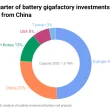The Global Reporting Initiative (GRI) has called on the European Commission to uphold the double materiality principle within the Corporate Sustainability Reporting Directive (CSRD), warning that any dilution of the framework would undermine corporate transparency and Europe’s competitive position in sustainability reporting.
In a letter addressed to European Commission President Ursula von der Leyen, Vice-President Stéphane Séjourné, and Commissioners Valdis Dombrovskis and Maria Luís Albuquerque, GRI’s newly appointed CEO Robin Hodess emphasised that double materiality—incorporating impacts, risks, and opportunities—is essential for delivering decision-useful data for investors, businesses, and policymakers.
Hodess stressed that the CSRD and the European Sustainability Reporting Standards (ESRS), in their current form, already support a competitive European economy by guiding investment towards sustainable, future-oriented business practices. He warned that removing double materiality would set Europe back to pre-2014, before the adoption of the Non-Financial Reporting Directive (NFRD), when no formal mechanisms held companies accountable for their environmental and social impacts.
The letter highlights that double materiality enhances corporate accountability, climate transition planning, and value chain oversight, aligning the CSRD with global sustainability standards. A recent GRI and World Benchmarking Alliance report found that companies adhering to impact reporting frameworks progress more rapidly in achieving sustainability objectives than those that do not.
GRI also pointed to international momentum behind double materiality, citing China’s largest stock exchanges and discussions at the 4th International Conference on Financing for Development (FfD4), where GRI and 11 global partners urged governments to adopt interoperable, double materiality-based sustainability reporting laws.
Hodess underscored the EU’s pivotal role in setting high-quality sustainability reporting standards, stating that maintaining double materiality is crucial for global alignment, a competitive and level playing field, and meaningful real-world impact. GRI has worked closely with the European Financial Reporting Advisory Group (EFRAG) under a formal Memorandum of Understanding (MoU) to align ESRS with global standards and ensure robust impact reporting.
The letter urges the European Commission to protect double materiality in the upcoming First Omnibus Package on Sustainability, warning that any weakening of the principle would undermine data comparability and hinder effective capital allocation.
















